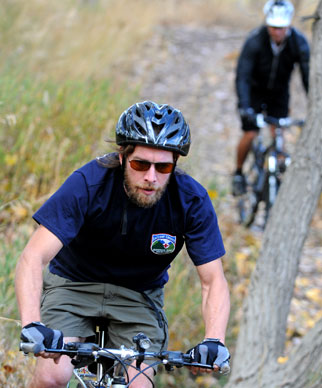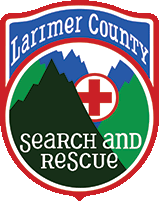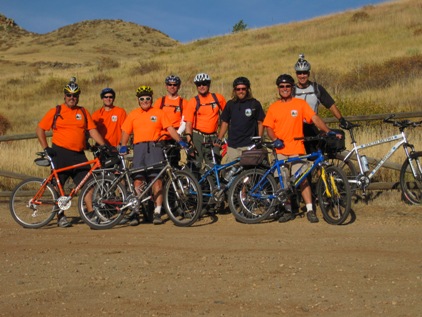Mountain Bike Team
Larimer County Search and Rescue, Inc. has formed a mountain bike group to be utilized as a search and rescue resource.
The mountain bike group receive their certification and training from the International Police Mountain Bike Association Additional trainings and practices are conducted locally at regular intervals by the group.
Some of the goals of a Mountain Bike team are as a hasty or confinement team for a lost subject, or for reaching an injured subject faster. Mountain bikes can often travel where cars and trucks can't or do not have access, therefore, gear can be transfered up trails faster. They also can be faster on trails and roads than a person traveling on foot. Mountain bikes are very quiet, therefore, they allow the riders to listen for sounds from the lost subject. These abilities make a mountain bike a valuable tool for wilderness and urban Search and Rescue operations.
With the addition of a fully functional Mountain Bike Team, LCSAR adds a level of versatility that nicely augments the existing services offered. The goals and appropriate uses of the mountain bike team combine to support and assist LCSAR in the completion of the intended mission. The primary reasons for adding mountain bikes to a search and rescue unit is the bike's potential ability to rapidly cover roads, trails and pathways in the search area. In addition, the bike team could quickly get to a mountain top to provide radio relay in remote areas as well as assisting with the transport of essential gear to the subjects location.
Working in teams of two, bike crews are assigned by the Incident Commander to check trails during a hasty search, effect containment using trails and roadways, and as a platform for visual tracking. Bike teams will check for signs of a person's passage, (foot or bike tire prints, gum wrappers, cigarettes, etc.) and can rapidly follow footprints that may belong to the missing party. Team members could set up "track traps" in areas the subject might pass through to catch footprints and follow any leads gained from them. Bikes will also be used to jump ahead on a subject's track, or travel ahead to attempt interception once a probable direction of travel is determined. Once a subject is located, cyclists with medical and rescue training and equipment can reach the individual(s) more rapidly than a team on foot, and begin rescue and/or medical stabilization efforts. Finally, the mountain bike team leader working in conjunction with the search mission coordinator determine additional SAR functions where bikes could be useful.
An additional benefit of the team is the enhancement of professionalism for the LCSAR organization and to provide an essential link to various biking groups in Larimer County and the surrounding region. Eventually, we hope team certified instructors could provide regional training to other SAR and Emergency Services groups that are initiating mountain bike operations.

Team Selection
Due to the physical demands placed on team members, and unique nature of the missions covered, highly motivated and experienced LCSAR team members are required. Additionally, team members must be physically fit. Team members shall be selected utilizing the following process:
- Mountain Bike Team participants must have completed the Larimer County Search and Rescue BASART Training.
- Must be in good standing with LCSAR.
- Each team member will provide and use their personal mountain bike in good and ride ready condition to be verified by a Bike Maintenance Tech.
- Participants must complete the Bike Team tryout, which consists of the East, West and South Valley loops at Lory State Park within a time specified by the team coordinator.
Team members will be evaluated for receiving a Bike Team Member Rating by utilizing the following criteria:
- Ability to operate and ride the bicycle safely and proficiently so as not to endanger themselves or anyone around them.
- Physical ability to properly perform their duties.
- Team participation during training sessions.
- Compliance with policies and procedures.
- Successful completion of the team training (LCSAR Mountain Bike Certification Policy - Section VI: Training).
LCSAR Mountain Bike Certification Policy Complete
By successful completion of this criteria members will receive the B1 LCSAR Bike Team rating. A B2 rating is achieved by completing advanced training yet to be determined. Advanced training will include proficient bicycle travel on intermediate and advanced trails as well as additional equipment and skills to travel under adverse weather conditions. Advanced mountain bike certifications will include mandatory monthly group practice.
Additionally:
- Team members shall be required to attend the International Police Mountain Bike Association ES Cyclist Certification Course.
- Team members may be required to attend additional intermediate or advanced bicycle handling skills sessions.
- As weather permits, monthly group conditioning rides may be scheduled.
- Bike Team Instructors will be required to attend and have a current certification in the IPMBA Instructor Training course. These instructors will be permitted to provide in-house training to LCSAR members as well as being able to go outside the team to provide training.
DISCLAIMER
While the use of bicycles and bicycle certified LCSAR members and equipment is a significant asset, they can also become a significant liabilty. LCSAR will strive to not put these resources at risk by using them innappropriately or when training becomes deficient.
Maintaining valid a Mountain Bike certification and equipment is a considerable additional investment of members time, as is training a dog or keeping up tracking, rescue, medical, or winter skills. We ask that team members not volunteer to take a field assignment for which they are not qualified.





